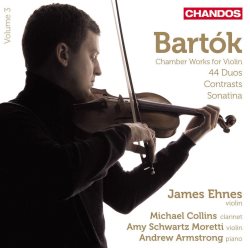| 
|
Bela BARTOK (1881-1945)
Chamber works for violin - Volume 3
Contrasts, for violin, clarinet and piano (1938) [16.12]
Sonatina, for violin and piano (1925, arr. Endre Gertler) [4.19]
Duos for two violins (1931) [48.00]
James Ehnes (violin)
Michael Collins (clarinet), Amy Schwartz Moretti (violin), Andrew Armstrong (piano)
rec. Potton Hall, Dunwich, Suffolk, 3 June 2012 (sonatina) and 18-19 June 2013
CHANDOS CHAN10820 [68.33]
Bartók led a positively triple life. Apart from his work as a composer, he was also an avid collector of folksongs and he also wrote a number of pedagogic works intended to aid in the training of young musicians. His most famous contribution to the latter field is probably his Mikrokosmos, a collection of piano pieces intended to lead from exercises suitable for absolute beginners to those which would defeat all but the most proficient of virtuosos. There have been a number of recordings of Mikrokosmos over the years, but I think it fair to say that many of the pieces in the earlier reaches of the work have more interest for those who are actually performing them rather than for general listening. On the other hand the forty-four Duos for two solo violins, like his earlier collection of piano pieces For children, have much more substance than those at the beginning of Mikrokosmos. They remain miniatures, but they make more demands on the players. Although not all of them may be based on folk sources, many also reveal Bartók’s activities in the field. Paul Griffiths in his informative booklet notes speculates also that the manner in which “the styles of diverse peoples are interlinked” might have been “a message that Bartók might have felt needed repeating at a time of growing threat from fascism.” A gently conveyed message, perhaps, but these pieces – although inevitably some have more immediate surface attraction than others – make their point succinctly.
The Duos are preceded on this disc by Bartók’s clarinet trio Contrasts. This has never been short of recordings ever since Bartók himself recorded it in America with Benny Goodman and Joseph Szigeti. Its infectious sense of bounce combining Hungarian folk rhythms with jazzy inflections makes it one of the composer’s most immediately appealing works. The trio here do it proud. To round out the disc we are given a recording of Bartók’s 1915 Sonatina for solo piano in a transcription for violin and piano by Endre Gertler. When shown it by a nervous Gertler, Bartók approved of the arrangement, saying that “I just wish I had written it for violin in the first place”. He was right: it works very well, and sounds perfectly suited to the two instruments. Again the folk element predominates.
It needs hardly to be observed that the performances here are absolutely immaculate even in the face of the most ferocious difficulties of tuning in some of the bitonal Duos. Those who might hesitate to listen to a whole disc of pedagogic studies one after another should be reassured that there is plenty of contrast between individual items, so that boredom never sets in. There are plenty of other recordings of the Contrasts, but rather fewer of the Duos and the current Archiv listings only include three alternatives of the Sonatina arrangement ... one of them apparently played on the double-bass. The last makes a most attractive if rather insubstantial bonus, and deserves much more attention than it has received. The recorded sound is absolutely excellent – what a lovely acoustic Potton Hall has.
Paul Corfield Godfrey
 |
 |
|



 All Nimbus reviews
All Nimbus reviews








